IFY Advanced Economics: Monetary and Fiscal Policy in Egypt Economy
VerifiedAdded on 2023/06/07
|9
|2319
|337
Essay
AI Summary
This essay provides an analysis of monetary and fiscal policies, emphasizing their significance in shaping economies, particularly in the context of Egypt. It discusses the importance of these policies in influencing economic decisions, aggregate demand, and overall economic stability. The essay explores the differences between expansionary monetary and fiscal policies, highlighting their potential benefits and drawbacks. It also examines the role of procyclical and countercyclical policies, considering the economic and institutional frameworks that guide policy choices. Furthermore, the analysis focuses on the specific case of Egypt, evaluating the suitability of monetary and fiscal policies in addressing economic challenges such as inflation and commodity price volatility. The essay concludes by summarizing the advantages of both monetary and fiscal policies, emphasizing their crucial role in maintaining a stable and thriving economy. The document is available on Desklib, a platform offering a wide array of study tools and solved assignments for students.
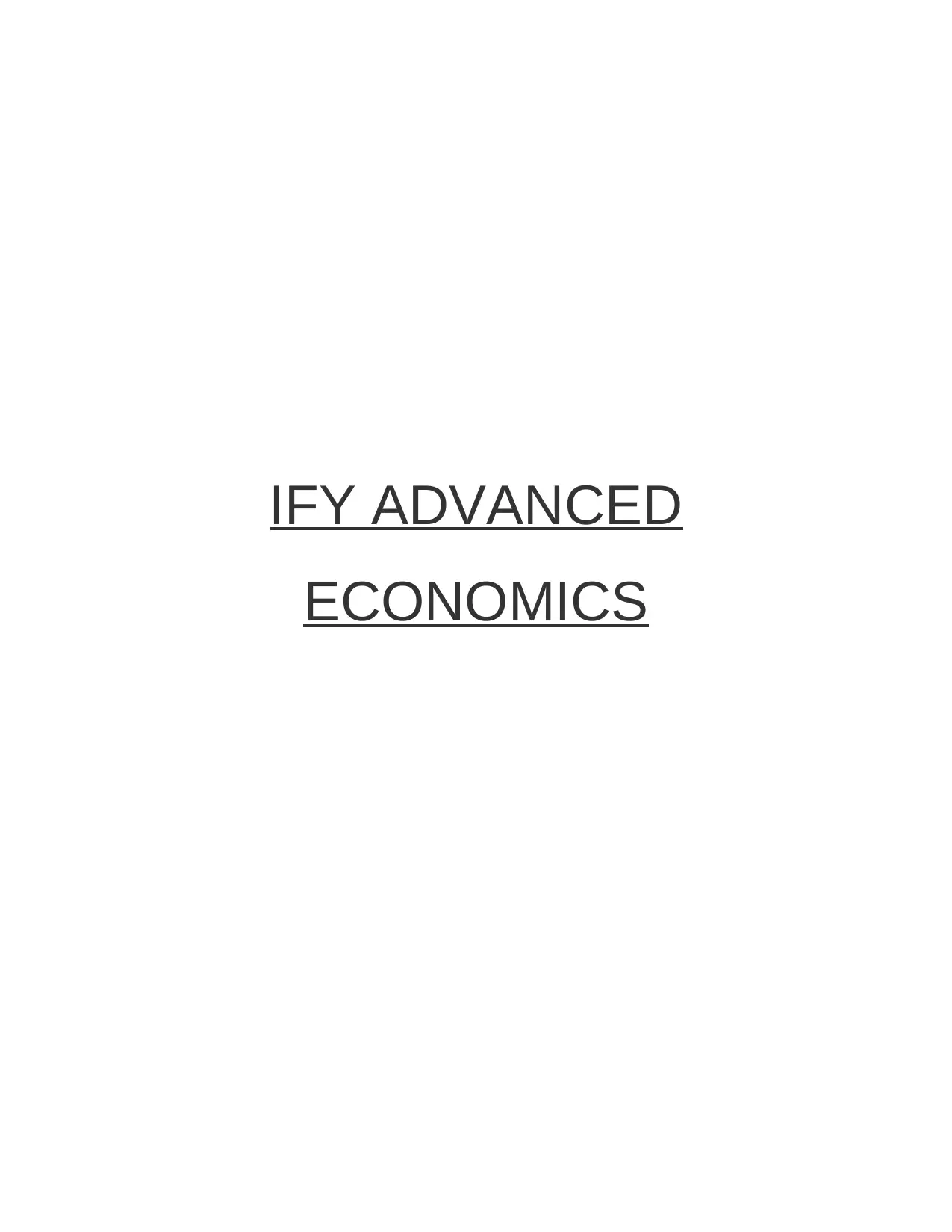
IFY ADVANCED
ECONOMICS
ECONOMICS
Paraphrase This Document
Need a fresh take? Get an instant paraphrase of this document with our AI Paraphraser
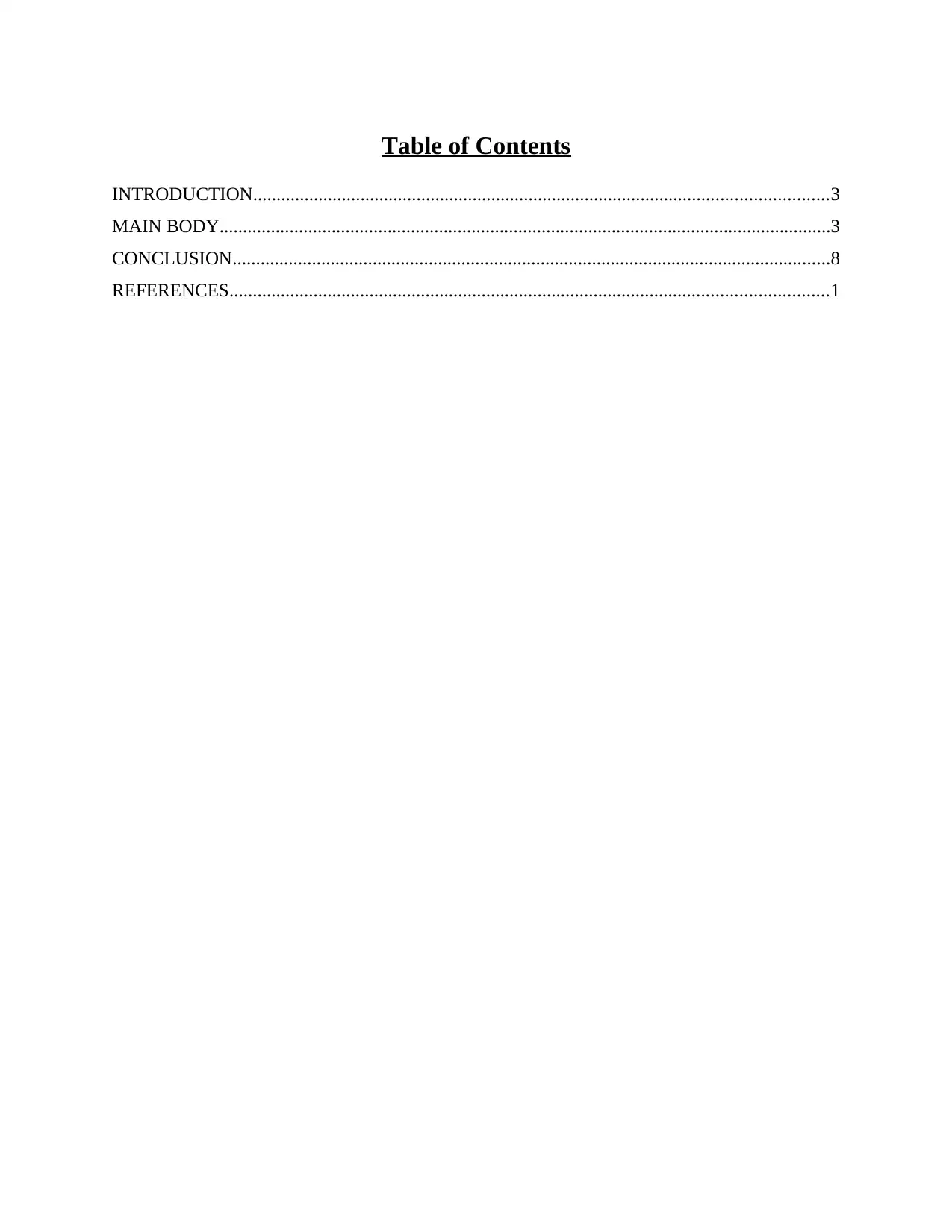
Table of Contents
INTRODUCTION...........................................................................................................................3
MAIN BODY...................................................................................................................................3
CONCLUSION................................................................................................................................8
REFERENCES................................................................................................................................1
INTRODUCTION...........................................................................................................................3
MAIN BODY...................................................................................................................................3
CONCLUSION................................................................................................................................8
REFERENCES................................................................................................................................1
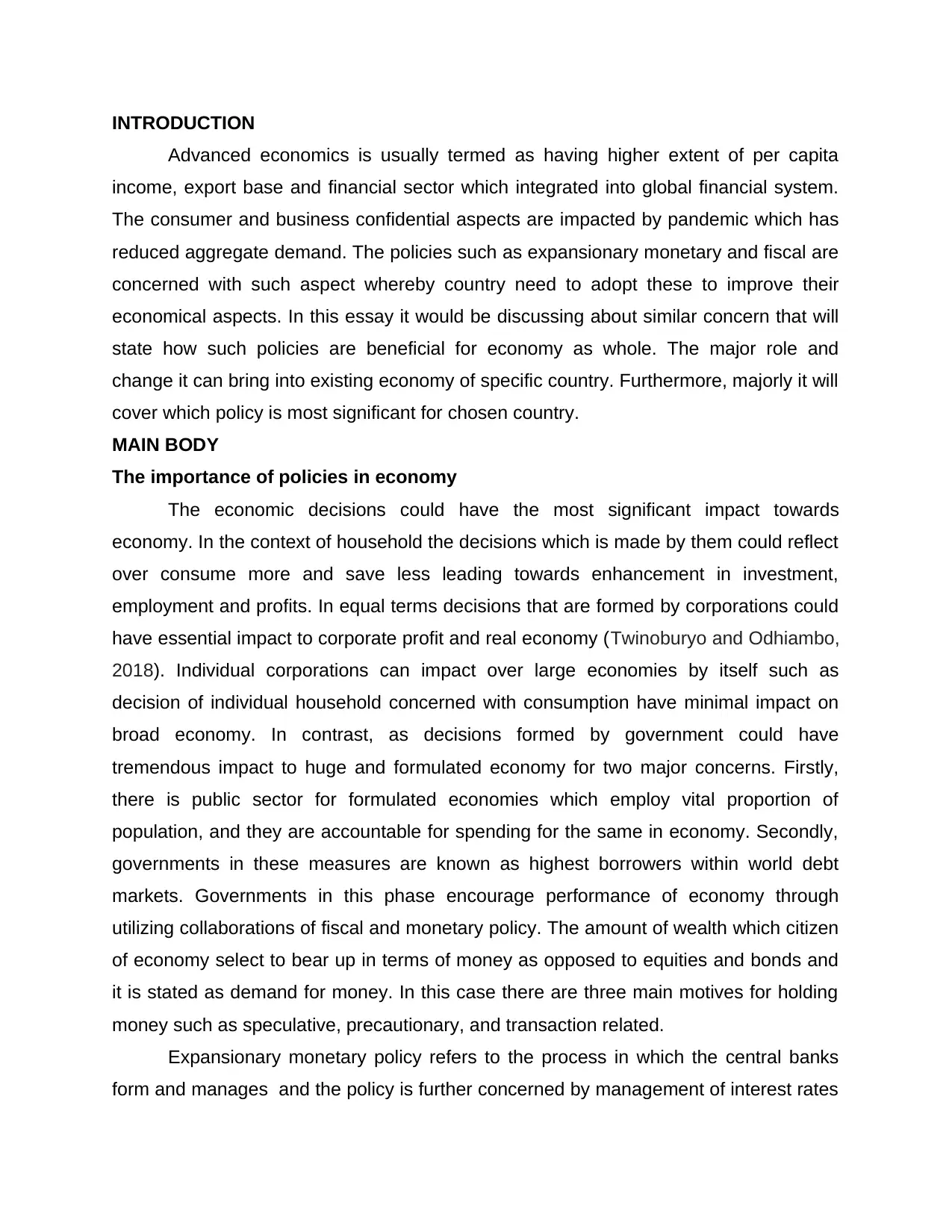
INTRODUCTION
Advanced economics is usually termed as having higher extent of per capita
income, export base and financial sector which integrated into global financial system.
The consumer and business confidential aspects are impacted by pandemic which has
reduced aggregate demand. The policies such as expansionary monetary and fiscal are
concerned with such aspect whereby country need to adopt these to improve their
economical aspects. In this essay it would be discussing about similar concern that will
state how such policies are beneficial for economy as whole. The major role and
change it can bring into existing economy of specific country. Furthermore, majorly it will
cover which policy is most significant for chosen country.
MAIN BODY
The importance of policies in economy
The economic decisions could have the most significant impact towards
economy. In the context of household the decisions which is made by them could reflect
over consume more and save less leading towards enhancement in investment,
employment and profits. In equal terms decisions that are formed by corporations could
have essential impact to corporate profit and real economy (Twinoburyo and Odhiambo,
2018). Individual corporations can impact over large economies by itself such as
decision of individual household concerned with consumption have minimal impact on
broad economy. In contrast, as decisions formed by government could have
tremendous impact to huge and formulated economy for two major concerns. Firstly,
there is public sector for formulated economies which employ vital proportion of
population, and they are accountable for spending for the same in economy. Secondly,
governments in these measures are known as highest borrowers within world debt
markets. Governments in this phase encourage performance of economy through
utilizing collaborations of fiscal and monetary policy. The amount of wealth which citizen
of economy select to bear up in terms of money as opposed to equities and bonds and
it is stated as demand for money. In this case there are three main motives for holding
money such as speculative, precautionary, and transaction related.
Expansionary monetary policy refers to the process in which the central banks
form and manages and the policy is further concerned by management of interest rates
Advanced economics is usually termed as having higher extent of per capita
income, export base and financial sector which integrated into global financial system.
The consumer and business confidential aspects are impacted by pandemic which has
reduced aggregate demand. The policies such as expansionary monetary and fiscal are
concerned with such aspect whereby country need to adopt these to improve their
economical aspects. In this essay it would be discussing about similar concern that will
state how such policies are beneficial for economy as whole. The major role and
change it can bring into existing economy of specific country. Furthermore, majorly it will
cover which policy is most significant for chosen country.
MAIN BODY
The importance of policies in economy
The economic decisions could have the most significant impact towards
economy. In the context of household the decisions which is made by them could reflect
over consume more and save less leading towards enhancement in investment,
employment and profits. In equal terms decisions that are formed by corporations could
have essential impact to corporate profit and real economy (Twinoburyo and Odhiambo,
2018). Individual corporations can impact over large economies by itself such as
decision of individual household concerned with consumption have minimal impact on
broad economy. In contrast, as decisions formed by government could have
tremendous impact to huge and formulated economy for two major concerns. Firstly,
there is public sector for formulated economies which employ vital proportion of
population, and they are accountable for spending for the same in economy. Secondly,
governments in these measures are known as highest borrowers within world debt
markets. Governments in this phase encourage performance of economy through
utilizing collaborations of fiscal and monetary policy. The amount of wealth which citizen
of economy select to bear up in terms of money as opposed to equities and bonds and
it is stated as demand for money. In this case there are three main motives for holding
money such as speculative, precautionary, and transaction related.
Expansionary monetary policy refers to the process in which the central banks
form and manages and the policy is further concerned by management of interest rates
⊘ This is a preview!⊘
Do you want full access?
Subscribe today to unlock all pages.

Trusted by 1+ million students worldwide
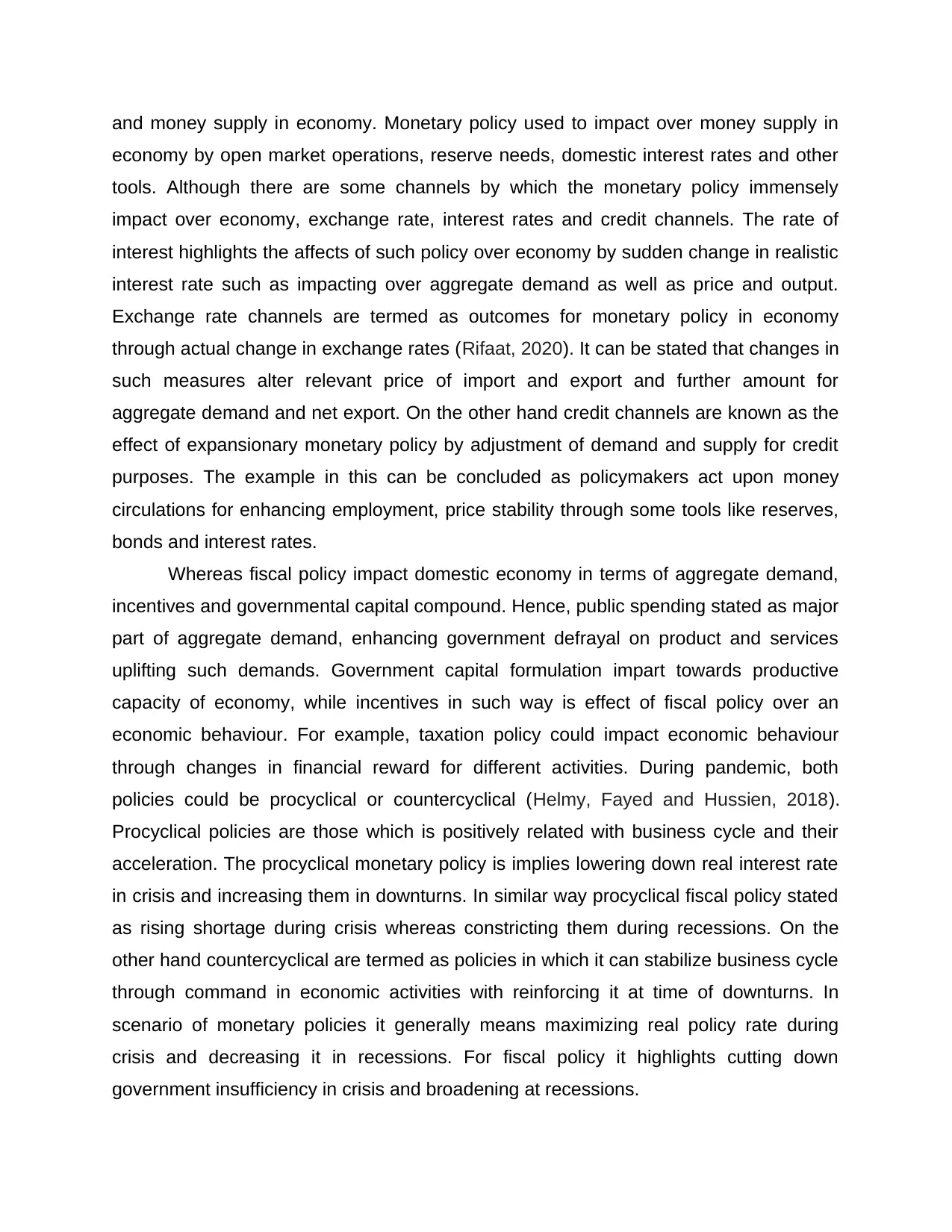
and money supply in economy. Monetary policy used to impact over money supply in
economy by open market operations, reserve needs, domestic interest rates and other
tools. Although there are some channels by which the monetary policy immensely
impact over economy, exchange rate, interest rates and credit channels. The rate of
interest highlights the affects of such policy over economy by sudden change in realistic
interest rate such as impacting over aggregate demand as well as price and output.
Exchange rate channels are termed as outcomes for monetary policy in economy
through actual change in exchange rates (Rifaat, 2020). It can be stated that changes in
such measures alter relevant price of import and export and further amount for
aggregate demand and net export. On the other hand credit channels are known as the
effect of expansionary monetary policy by adjustment of demand and supply for credit
purposes. The example in this can be concluded as policymakers act upon money
circulations for enhancing employment, price stability through some tools like reserves,
bonds and interest rates.
Whereas fiscal policy impact domestic economy in terms of aggregate demand,
incentives and governmental capital compound. Hence, public spending stated as major
part of aggregate demand, enhancing government defrayal on product and services
uplifting such demands. Government capital formulation impart towards productive
capacity of economy, while incentives in such way is effect of fiscal policy over an
economic behaviour. For example, taxation policy could impact economic behaviour
through changes in financial reward for different activities. During pandemic, both
policies could be procyclical or countercyclical (Helmy, Fayed and Hussien, 2018).
Procyclical policies are those which is positively related with business cycle and their
acceleration. The procyclical monetary policy is implies lowering down real interest rate
in crisis and increasing them in downturns. In similar way procyclical fiscal policy stated
as rising shortage during crisis whereas constricting them during recessions. On the
other hand countercyclical are termed as policies in which it can stabilize business cycle
through command in economic activities with reinforcing it at time of downturns. In
scenario of monetary policies it generally means maximizing real policy rate during
crisis and decreasing it in recessions. For fiscal policy it highlights cutting down
government insufficiency in crisis and broadening at recessions.
economy by open market operations, reserve needs, domestic interest rates and other
tools. Although there are some channels by which the monetary policy immensely
impact over economy, exchange rate, interest rates and credit channels. The rate of
interest highlights the affects of such policy over economy by sudden change in realistic
interest rate such as impacting over aggregate demand as well as price and output.
Exchange rate channels are termed as outcomes for monetary policy in economy
through actual change in exchange rates (Rifaat, 2020). It can be stated that changes in
such measures alter relevant price of import and export and further amount for
aggregate demand and net export. On the other hand credit channels are known as the
effect of expansionary monetary policy by adjustment of demand and supply for credit
purposes. The example in this can be concluded as policymakers act upon money
circulations for enhancing employment, price stability through some tools like reserves,
bonds and interest rates.
Whereas fiscal policy impact domestic economy in terms of aggregate demand,
incentives and governmental capital compound. Hence, public spending stated as major
part of aggregate demand, enhancing government defrayal on product and services
uplifting such demands. Government capital formulation impart towards productive
capacity of economy, while incentives in such way is effect of fiscal policy over an
economic behaviour. For example, taxation policy could impact economic behaviour
through changes in financial reward for different activities. During pandemic, both
policies could be procyclical or countercyclical (Helmy, Fayed and Hussien, 2018).
Procyclical policies are those which is positively related with business cycle and their
acceleration. The procyclical monetary policy is implies lowering down real interest rate
in crisis and increasing them in downturns. In similar way procyclical fiscal policy stated
as rising shortage during crisis whereas constricting them during recessions. On the
other hand countercyclical are termed as policies in which it can stabilize business cycle
through command in economic activities with reinforcing it at time of downturns. In
scenario of monetary policies it generally means maximizing real policy rate during
crisis and decreasing it in recessions. For fiscal policy it highlights cutting down
government insufficiency in crisis and broadening at recessions.
Paraphrase This Document
Need a fresh take? Get an instant paraphrase of this document with our AI Paraphraser
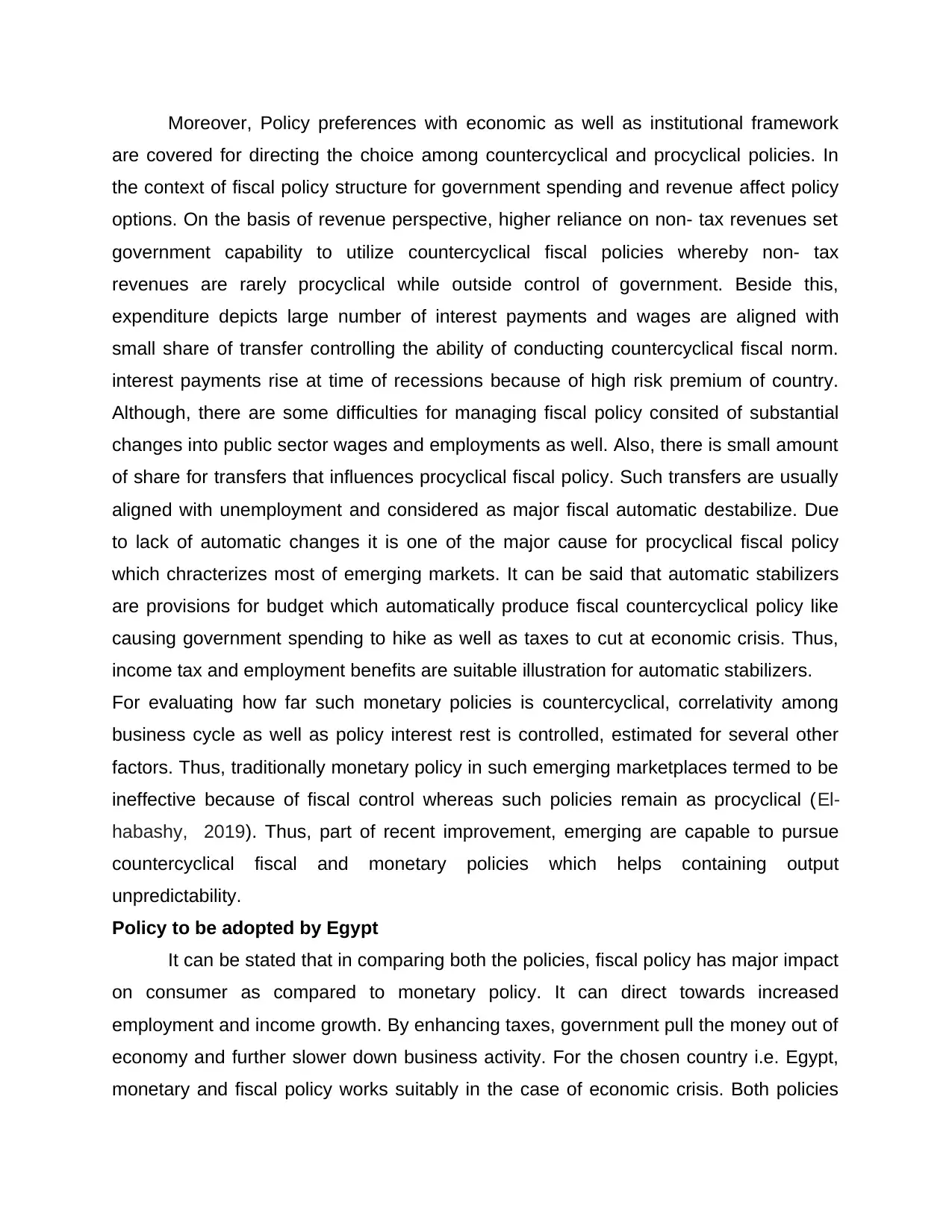
Moreover, Policy preferences with economic as well as institutional framework
are covered for directing the choice among countercyclical and procyclical policies. In
the context of fiscal policy structure for government spending and revenue affect policy
options. On the basis of revenue perspective, higher reliance on non- tax revenues set
government capability to utilize countercyclical fiscal policies whereby non- tax
revenues are rarely procyclical while outside control of government. Beside this,
expenditure depicts large number of interest payments and wages are aligned with
small share of transfer controlling the ability of conducting countercyclical fiscal norm.
interest payments rise at time of recessions because of high risk premium of country.
Although, there are some difficulties for managing fiscal policy consited of substantial
changes into public sector wages and employments as well. Also, there is small amount
of share for transfers that influences procyclical fiscal policy. Such transfers are usually
aligned with unemployment and considered as major fiscal automatic destabilize. Due
to lack of automatic changes it is one of the major cause for procyclical fiscal policy
which chracterizes most of emerging markets. It can be said that automatic stabilizers
are provisions for budget which automatically produce fiscal countercyclical policy like
causing government spending to hike as well as taxes to cut at economic crisis. Thus,
income tax and employment benefits are suitable illustration for automatic stabilizers.
For evaluating how far such monetary policies is countercyclical, correlativity among
business cycle as well as policy interest rest is controlled, estimated for several other
factors. Thus, traditionally monetary policy in such emerging marketplaces termed to be
ineffective because of fiscal control whereas such policies remain as procyclical (El-
habashy, 2019). Thus, part of recent improvement, emerging are capable to pursue
countercyclical fiscal and monetary policies which helps containing output
unpredictability.
Policy to be adopted by Egypt
It can be stated that in comparing both the policies, fiscal policy has major impact
on consumer as compared to monetary policy. It can direct towards increased
employment and income growth. By enhancing taxes, government pull the money out of
economy and further slower down business activity. For the chosen country i.e. Egypt,
monetary and fiscal policy works suitably in the case of economic crisis. Both policies
are covered for directing the choice among countercyclical and procyclical policies. In
the context of fiscal policy structure for government spending and revenue affect policy
options. On the basis of revenue perspective, higher reliance on non- tax revenues set
government capability to utilize countercyclical fiscal policies whereby non- tax
revenues are rarely procyclical while outside control of government. Beside this,
expenditure depicts large number of interest payments and wages are aligned with
small share of transfer controlling the ability of conducting countercyclical fiscal norm.
interest payments rise at time of recessions because of high risk premium of country.
Although, there are some difficulties for managing fiscal policy consited of substantial
changes into public sector wages and employments as well. Also, there is small amount
of share for transfers that influences procyclical fiscal policy. Such transfers are usually
aligned with unemployment and considered as major fiscal automatic destabilize. Due
to lack of automatic changes it is one of the major cause for procyclical fiscal policy
which chracterizes most of emerging markets. It can be said that automatic stabilizers
are provisions for budget which automatically produce fiscal countercyclical policy like
causing government spending to hike as well as taxes to cut at economic crisis. Thus,
income tax and employment benefits are suitable illustration for automatic stabilizers.
For evaluating how far such monetary policies is countercyclical, correlativity among
business cycle as well as policy interest rest is controlled, estimated for several other
factors. Thus, traditionally monetary policy in such emerging marketplaces termed to be
ineffective because of fiscal control whereas such policies remain as procyclical (El-
habashy, 2019). Thus, part of recent improvement, emerging are capable to pursue
countercyclical fiscal and monetary policies which helps containing output
unpredictability.
Policy to be adopted by Egypt
It can be stated that in comparing both the policies, fiscal policy has major impact
on consumer as compared to monetary policy. It can direct towards increased
employment and income growth. By enhancing taxes, government pull the money out of
economy and further slower down business activity. For the chosen country i.e. Egypt,
monetary and fiscal policy works suitably in the case of economic crisis. Both policies
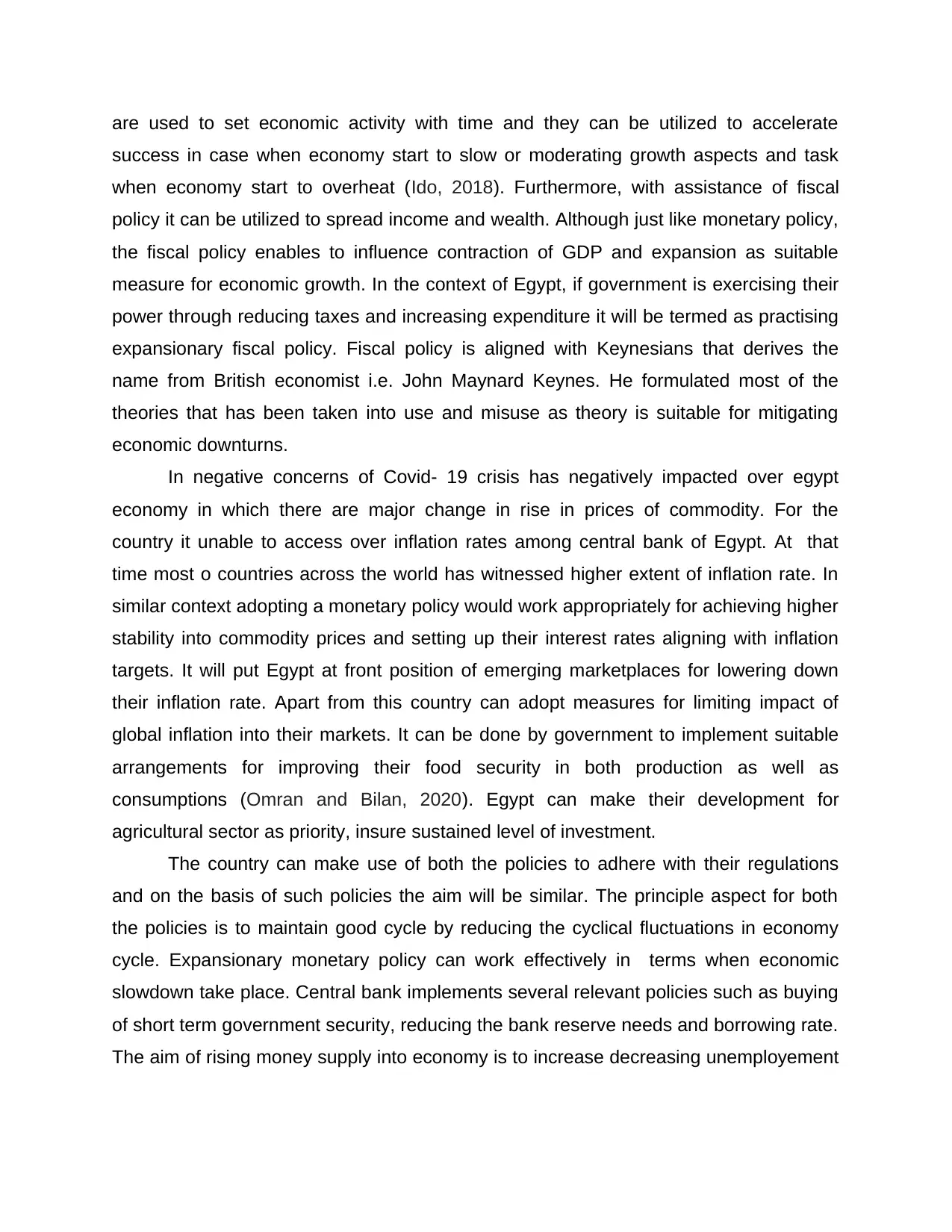
are used to set economic activity with time and they can be utilized to accelerate
success in case when economy start to slow or moderating growth aspects and task
when economy start to overheat (Ido, 2018). Furthermore, with assistance of fiscal
policy it can be utilized to spread income and wealth. Although just like monetary policy,
the fiscal policy enables to influence contraction of GDP and expansion as suitable
measure for economic growth. In the context of Egypt, if government is exercising their
power through reducing taxes and increasing expenditure it will be termed as practising
expansionary fiscal policy. Fiscal policy is aligned with Keynesians that derives the
name from British economist i.e. John Maynard Keynes. He formulated most of the
theories that has been taken into use and misuse as theory is suitable for mitigating
economic downturns.
In negative concerns of Covid- 19 crisis has negatively impacted over egypt
economy in which there are major change in rise in prices of commodity. For the
country it unable to access over inflation rates among central bank of Egypt. At that
time most o countries across the world has witnessed higher extent of inflation rate. In
similar context adopting a monetary policy would work appropriately for achieving higher
stability into commodity prices and setting up their interest rates aligning with inflation
targets. It will put Egypt at front position of emerging marketplaces for lowering down
their inflation rate. Apart from this country can adopt measures for limiting impact of
global inflation into their markets. It can be done by government to implement suitable
arrangements for improving their food security in both production as well as
consumptions (Omran and Bilan, 2020). Egypt can make their development for
agricultural sector as priority, insure sustained level of investment.
The country can make use of both the policies to adhere with their regulations
and on the basis of such policies the aim will be similar. The principle aspect for both
the policies is to maintain good cycle by reducing the cyclical fluctuations in economy
cycle. Expansionary monetary policy can work effectively in terms when economic
slowdown take place. Central bank implements several relevant policies such as buying
of short term government security, reducing the bank reserve needs and borrowing rate.
The aim of rising money supply into economy is to increase decreasing unemployement
success in case when economy start to slow or moderating growth aspects and task
when economy start to overheat (Ido, 2018). Furthermore, with assistance of fiscal
policy it can be utilized to spread income and wealth. Although just like monetary policy,
the fiscal policy enables to influence contraction of GDP and expansion as suitable
measure for economic growth. In the context of Egypt, if government is exercising their
power through reducing taxes and increasing expenditure it will be termed as practising
expansionary fiscal policy. Fiscal policy is aligned with Keynesians that derives the
name from British economist i.e. John Maynard Keynes. He formulated most of the
theories that has been taken into use and misuse as theory is suitable for mitigating
economic downturns.
In negative concerns of Covid- 19 crisis has negatively impacted over egypt
economy in which there are major change in rise in prices of commodity. For the
country it unable to access over inflation rates among central bank of Egypt. At that
time most o countries across the world has witnessed higher extent of inflation rate. In
similar context adopting a monetary policy would work appropriately for achieving higher
stability into commodity prices and setting up their interest rates aligning with inflation
targets. It will put Egypt at front position of emerging marketplaces for lowering down
their inflation rate. Apart from this country can adopt measures for limiting impact of
global inflation into their markets. It can be done by government to implement suitable
arrangements for improving their food security in both production as well as
consumptions (Omran and Bilan, 2020). Egypt can make their development for
agricultural sector as priority, insure sustained level of investment.
The country can make use of both the policies to adhere with their regulations
and on the basis of such policies the aim will be similar. The principle aspect for both
the policies is to maintain good cycle by reducing the cyclical fluctuations in economy
cycle. Expansionary monetary policy can work effectively in terms when economic
slowdown take place. Central bank implements several relevant policies such as buying
of short term government security, reducing the bank reserve needs and borrowing rate.
The aim of rising money supply into economy is to increase decreasing unemployement
⊘ This is a preview!⊘
Do you want full access?
Subscribe today to unlock all pages.

Trusted by 1+ million students worldwide
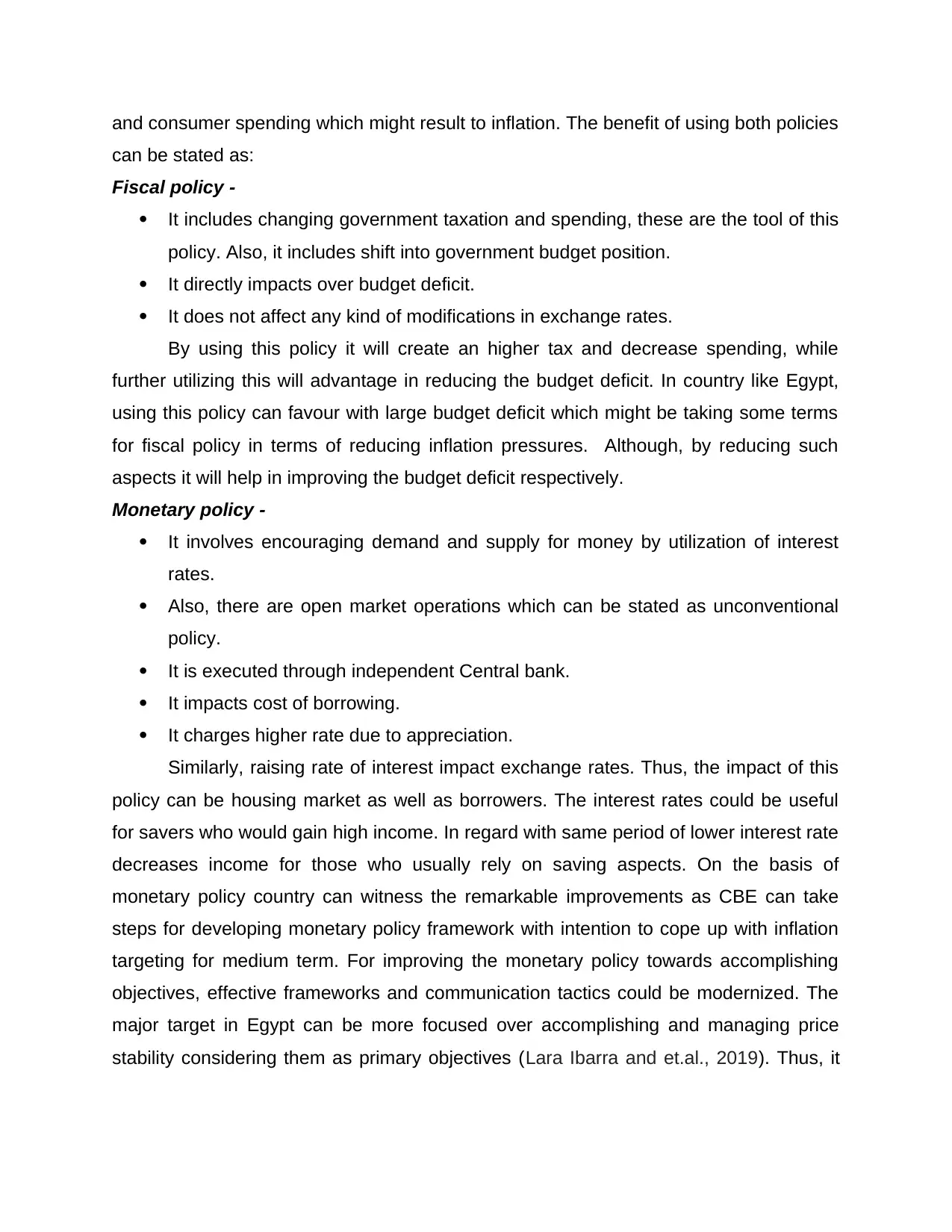
and consumer spending which might result to inflation. The benefit of using both policies
can be stated as:
Fiscal policy -
It includes changing government taxation and spending, these are the tool of this
policy. Also, it includes shift into government budget position.
It directly impacts over budget deficit.
It does not affect any kind of modifications in exchange rates.
By using this policy it will create an higher tax and decrease spending, while
further utilizing this will advantage in reducing the budget deficit. In country like Egypt,
using this policy can favour with large budget deficit which might be taking some terms
for fiscal policy in terms of reducing inflation pressures. Although, by reducing such
aspects it will help in improving the budget deficit respectively.
Monetary policy -
It involves encouraging demand and supply for money by utilization of interest
rates.
Also, there are open market operations which can be stated as unconventional
policy.
It is executed through independent Central bank.
It impacts cost of borrowing.
It charges higher rate due to appreciation.
Similarly, raising rate of interest impact exchange rates. Thus, the impact of this
policy can be housing market as well as borrowers. The interest rates could be useful
for savers who would gain high income. In regard with same period of lower interest rate
decreases income for those who usually rely on saving aspects. On the basis of
monetary policy country can witness the remarkable improvements as CBE can take
steps for developing monetary policy framework with intention to cope up with inflation
targeting for medium term. For improving the monetary policy towards accomplishing
objectives, effective frameworks and communication tactics could be modernized. The
major target in Egypt can be more focused over accomplishing and managing price
stability considering them as primary objectives (Lara Ibarra and et.al., 2019). Thus, it
can be stated as:
Fiscal policy -
It includes changing government taxation and spending, these are the tool of this
policy. Also, it includes shift into government budget position.
It directly impacts over budget deficit.
It does not affect any kind of modifications in exchange rates.
By using this policy it will create an higher tax and decrease spending, while
further utilizing this will advantage in reducing the budget deficit. In country like Egypt,
using this policy can favour with large budget deficit which might be taking some terms
for fiscal policy in terms of reducing inflation pressures. Although, by reducing such
aspects it will help in improving the budget deficit respectively.
Monetary policy -
It involves encouraging demand and supply for money by utilization of interest
rates.
Also, there are open market operations which can be stated as unconventional
policy.
It is executed through independent Central bank.
It impacts cost of borrowing.
It charges higher rate due to appreciation.
Similarly, raising rate of interest impact exchange rates. Thus, the impact of this
policy can be housing market as well as borrowers. The interest rates could be useful
for savers who would gain high income. In regard with same period of lower interest rate
decreases income for those who usually rely on saving aspects. On the basis of
monetary policy country can witness the remarkable improvements as CBE can take
steps for developing monetary policy framework with intention to cope up with inflation
targeting for medium term. For improving the monetary policy towards accomplishing
objectives, effective frameworks and communication tactics could be modernized. The
major target in Egypt can be more focused over accomplishing and managing price
stability considering them as primary objectives (Lara Ibarra and et.al., 2019). Thus, it
Paraphrase This Document
Need a fresh take? Get an instant paraphrase of this document with our AI Paraphraser
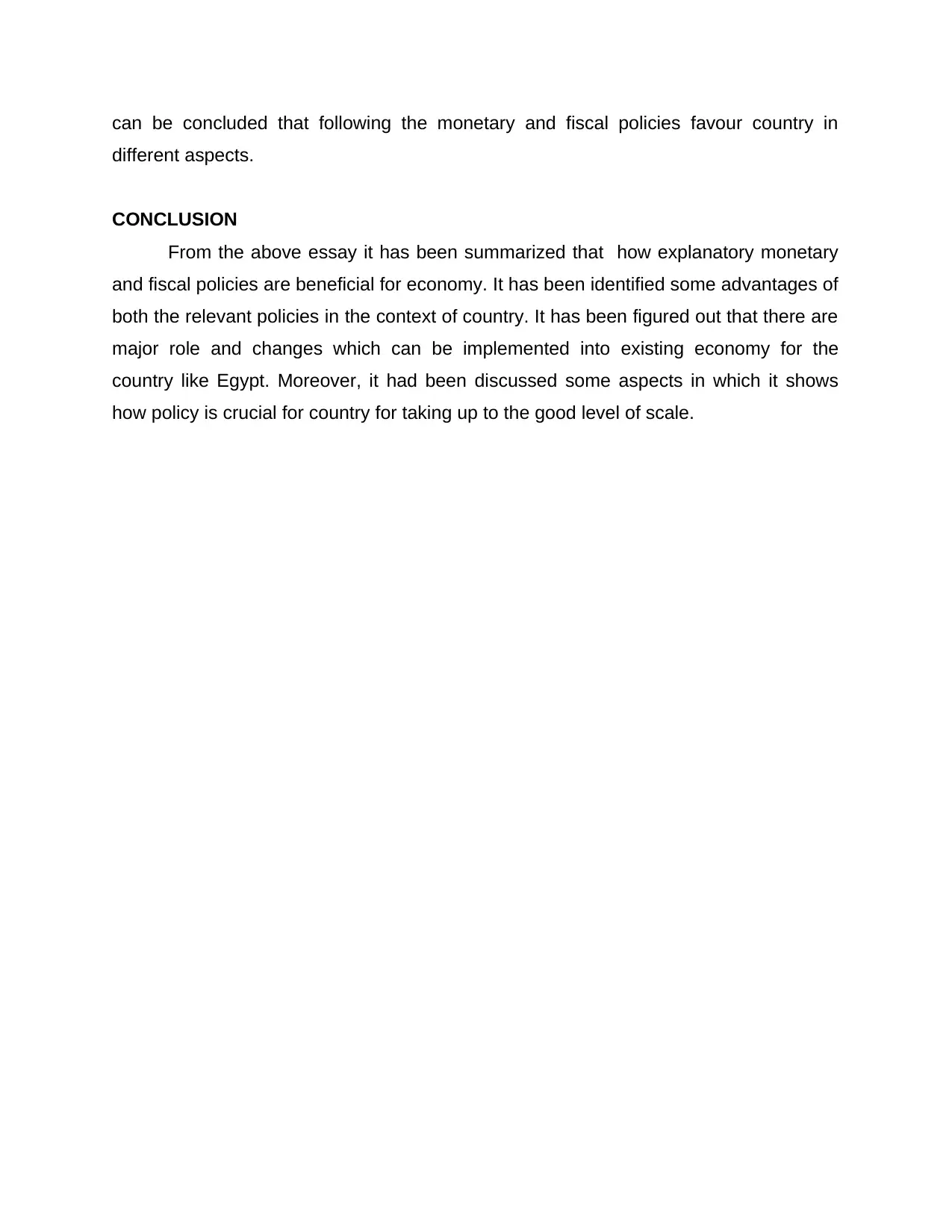
can be concluded that following the monetary and fiscal policies favour country in
different aspects.
CONCLUSION
From the above essay it has been summarized that how explanatory monetary
and fiscal policies are beneficial for economy. It has been identified some advantages of
both the relevant policies in the context of country. It has been figured out that there are
major role and changes which can be implemented into existing economy for the
country like Egypt. Moreover, it had been discussed some aspects in which it shows
how policy is crucial for country for taking up to the good level of scale.
different aspects.
CONCLUSION
From the above essay it has been summarized that how explanatory monetary
and fiscal policies are beneficial for economy. It has been identified some advantages of
both the relevant policies in the context of country. It has been figured out that there are
major role and changes which can be implemented into existing economy for the
country like Egypt. Moreover, it had been discussed some aspects in which it shows
how policy is crucial for country for taking up to the good level of scale.
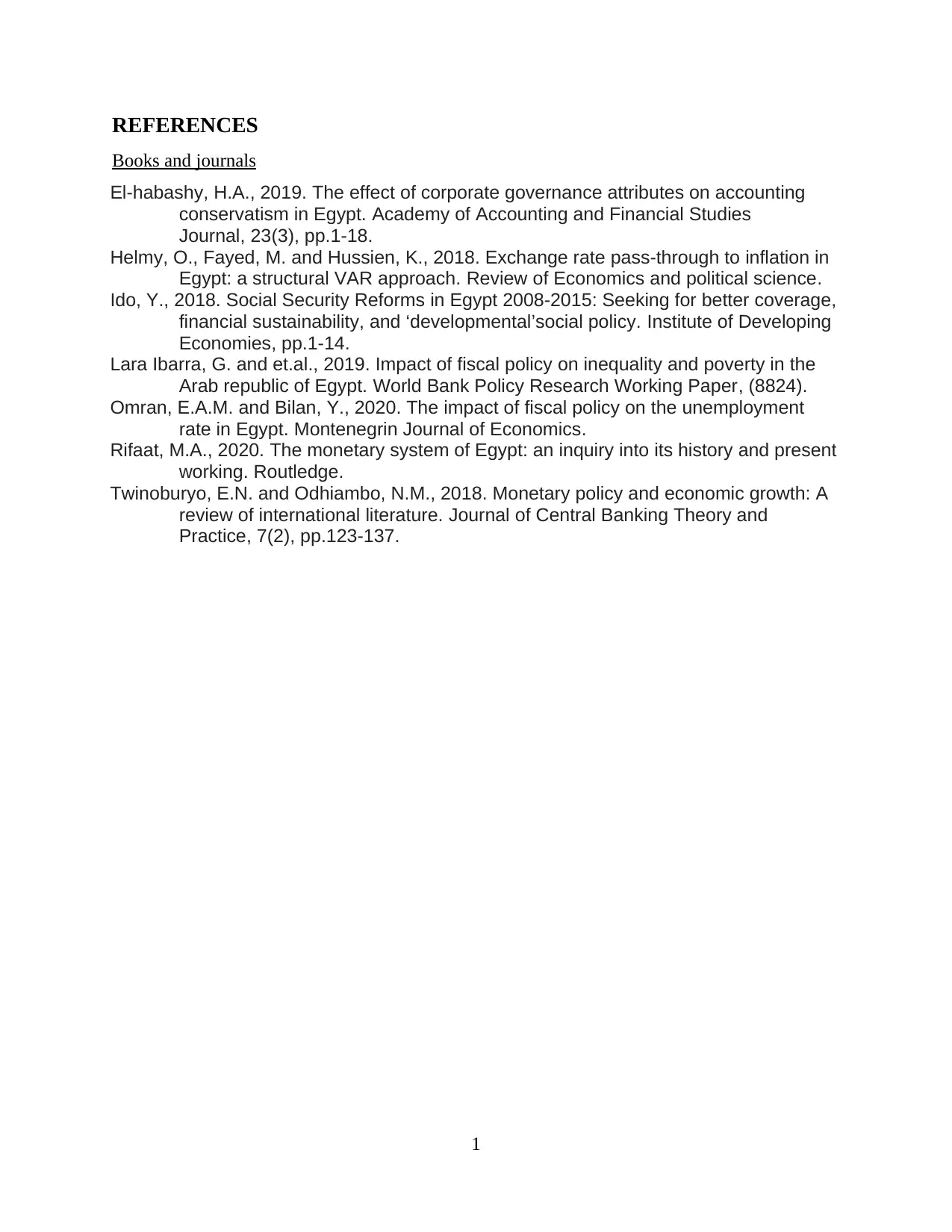
REFERENCES
Books and journals
El-habashy, H.A., 2019. The effect of corporate governance attributes on accounting
conservatism in Egypt. Academy of Accounting and Financial Studies
Journal, 23(3), pp.1-18.
Helmy, O., Fayed, M. and Hussien, K., 2018. Exchange rate pass-through to inflation in
Egypt: a structural VAR approach. Review of Economics and political science.
Ido, Y., 2018. Social Security Reforms in Egypt 2008-2015: Seeking for better coverage,
financial sustainability, and ‘developmental’social policy. Institute of Developing
Economies, pp.1-14.
Lara Ibarra, G. and et.al., 2019. Impact of fiscal policy on inequality and poverty in the
Arab republic of Egypt. World Bank Policy Research Working Paper, (8824).
Omran, E.A.M. and Bilan, Y., 2020. The impact of fiscal policy on the unemployment
rate in Egypt. Montenegrin Journal of Economics.
Rifaat, M.A., 2020. The monetary system of Egypt: an inquiry into its history and present
working. Routledge.
Twinoburyo, E.N. and Odhiambo, N.M., 2018. Monetary policy and economic growth: A
review of international literature. Journal of Central Banking Theory and
Practice, 7(2), pp.123-137.
1
Books and journals
El-habashy, H.A., 2019. The effect of corporate governance attributes on accounting
conservatism in Egypt. Academy of Accounting and Financial Studies
Journal, 23(3), pp.1-18.
Helmy, O., Fayed, M. and Hussien, K., 2018. Exchange rate pass-through to inflation in
Egypt: a structural VAR approach. Review of Economics and political science.
Ido, Y., 2018. Social Security Reforms in Egypt 2008-2015: Seeking for better coverage,
financial sustainability, and ‘developmental’social policy. Institute of Developing
Economies, pp.1-14.
Lara Ibarra, G. and et.al., 2019. Impact of fiscal policy on inequality and poverty in the
Arab republic of Egypt. World Bank Policy Research Working Paper, (8824).
Omran, E.A.M. and Bilan, Y., 2020. The impact of fiscal policy on the unemployment
rate in Egypt. Montenegrin Journal of Economics.
Rifaat, M.A., 2020. The monetary system of Egypt: an inquiry into its history and present
working. Routledge.
Twinoburyo, E.N. and Odhiambo, N.M., 2018. Monetary policy and economic growth: A
review of international literature. Journal of Central Banking Theory and
Practice, 7(2), pp.123-137.
1
⊘ This is a preview!⊘
Do you want full access?
Subscribe today to unlock all pages.

Trusted by 1+ million students worldwide
1 out of 9
Related Documents
Your All-in-One AI-Powered Toolkit for Academic Success.
+13062052269
info@desklib.com
Available 24*7 on WhatsApp / Email
![[object Object]](/_next/static/media/star-bottom.7253800d.svg)
Unlock your academic potential
Copyright © 2020–2025 A2Z Services. All Rights Reserved. Developed and managed by ZUCOL.





